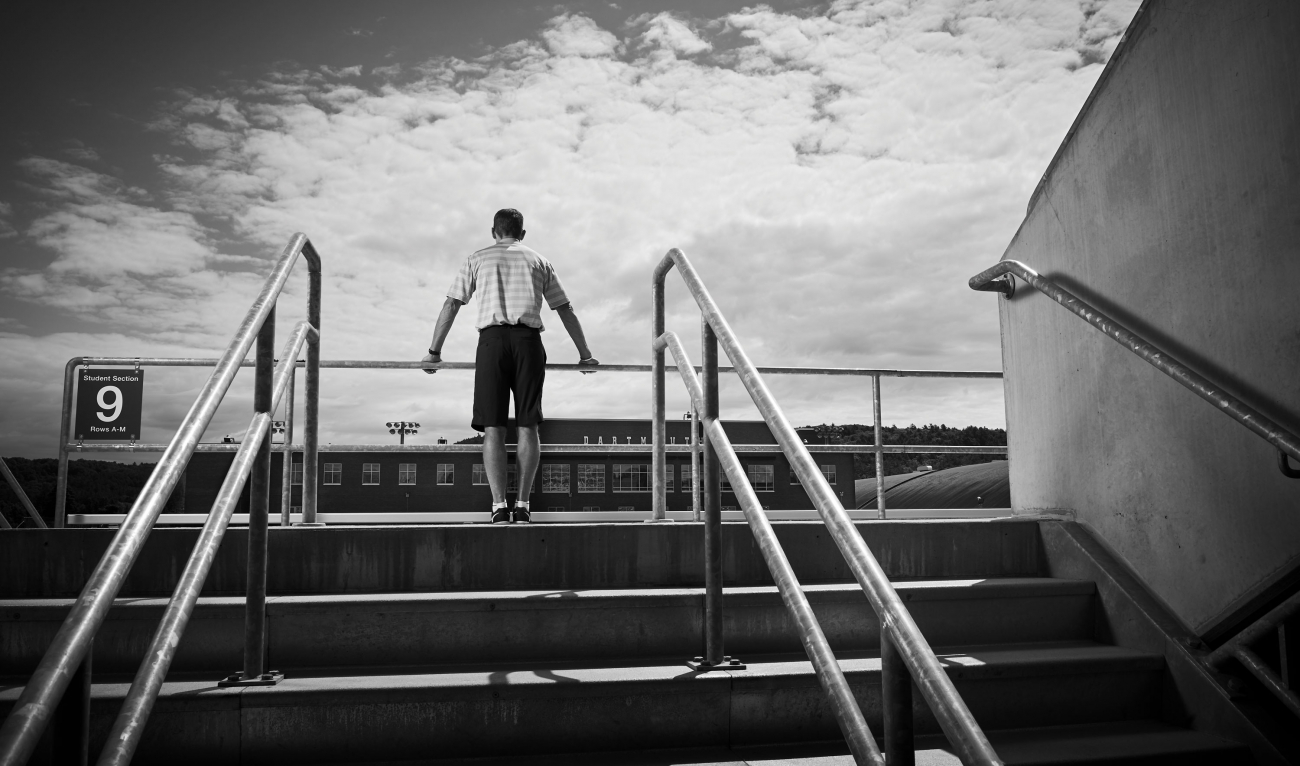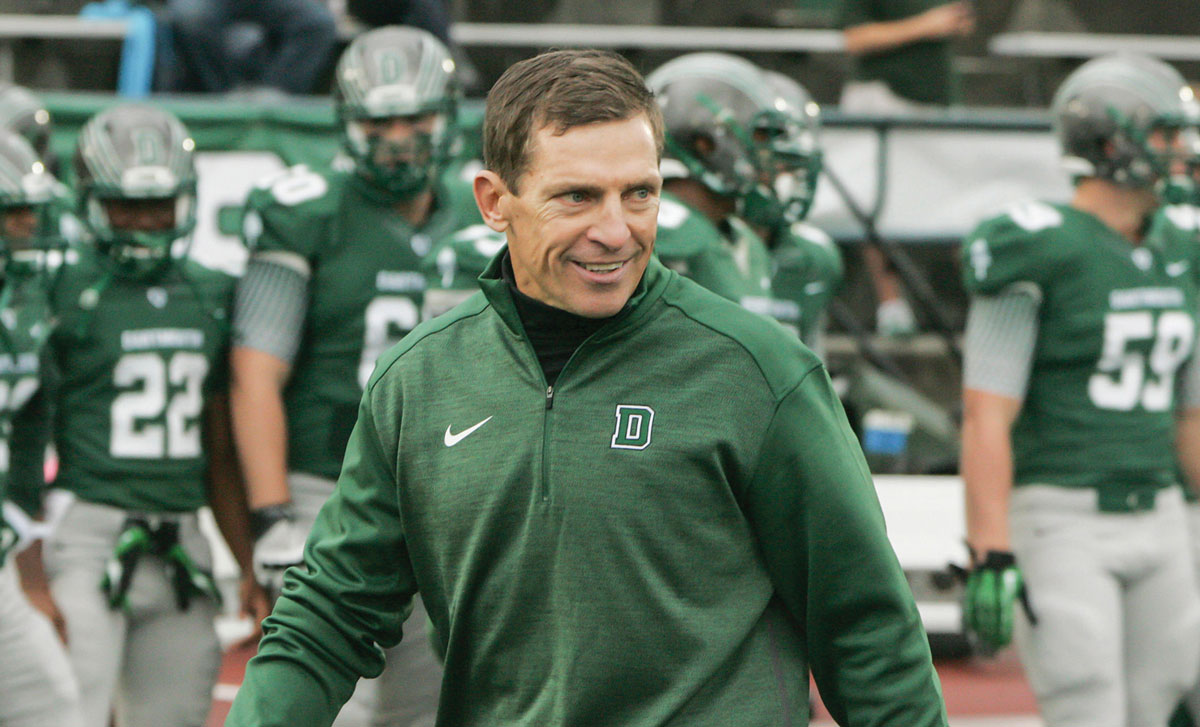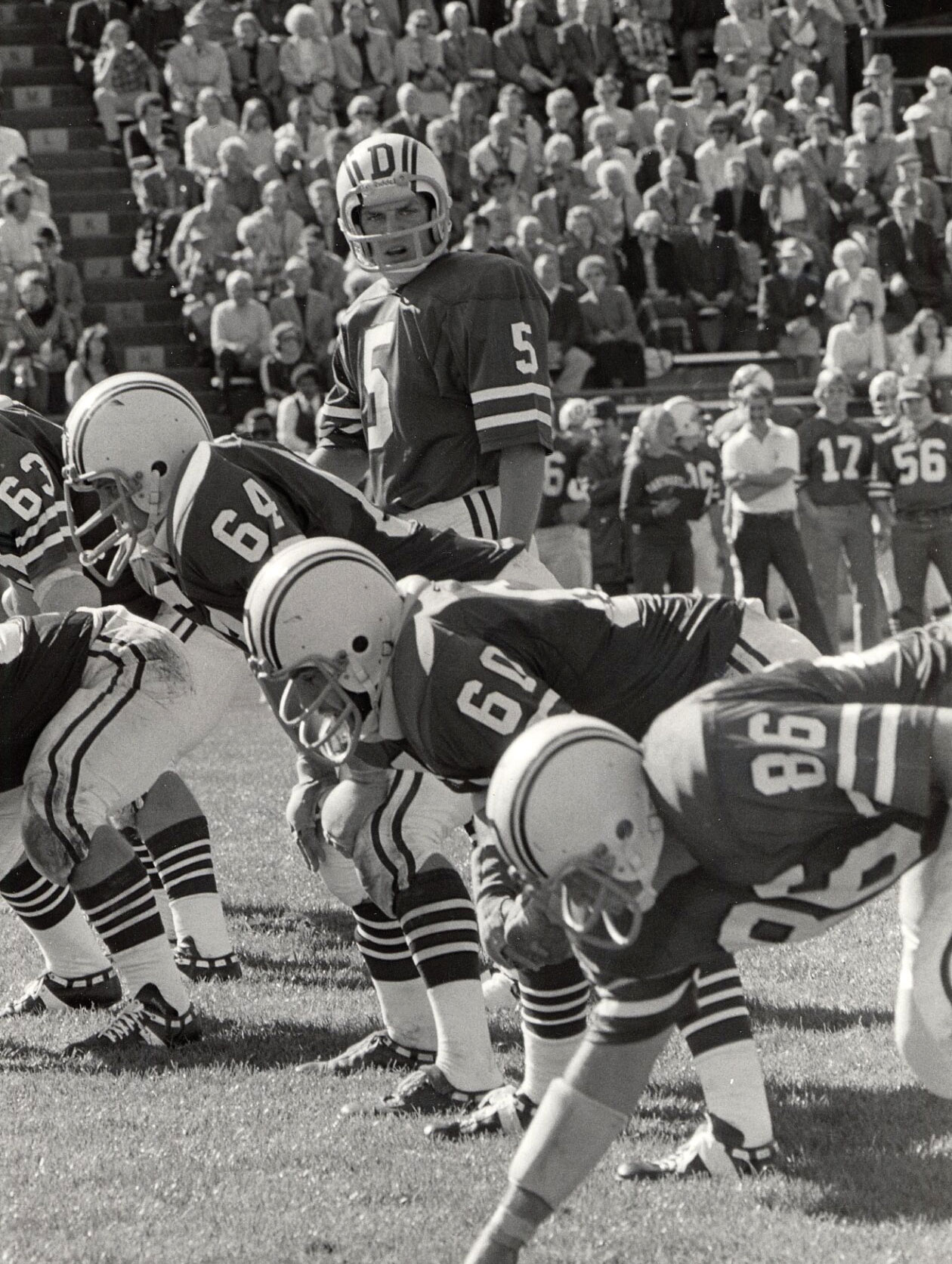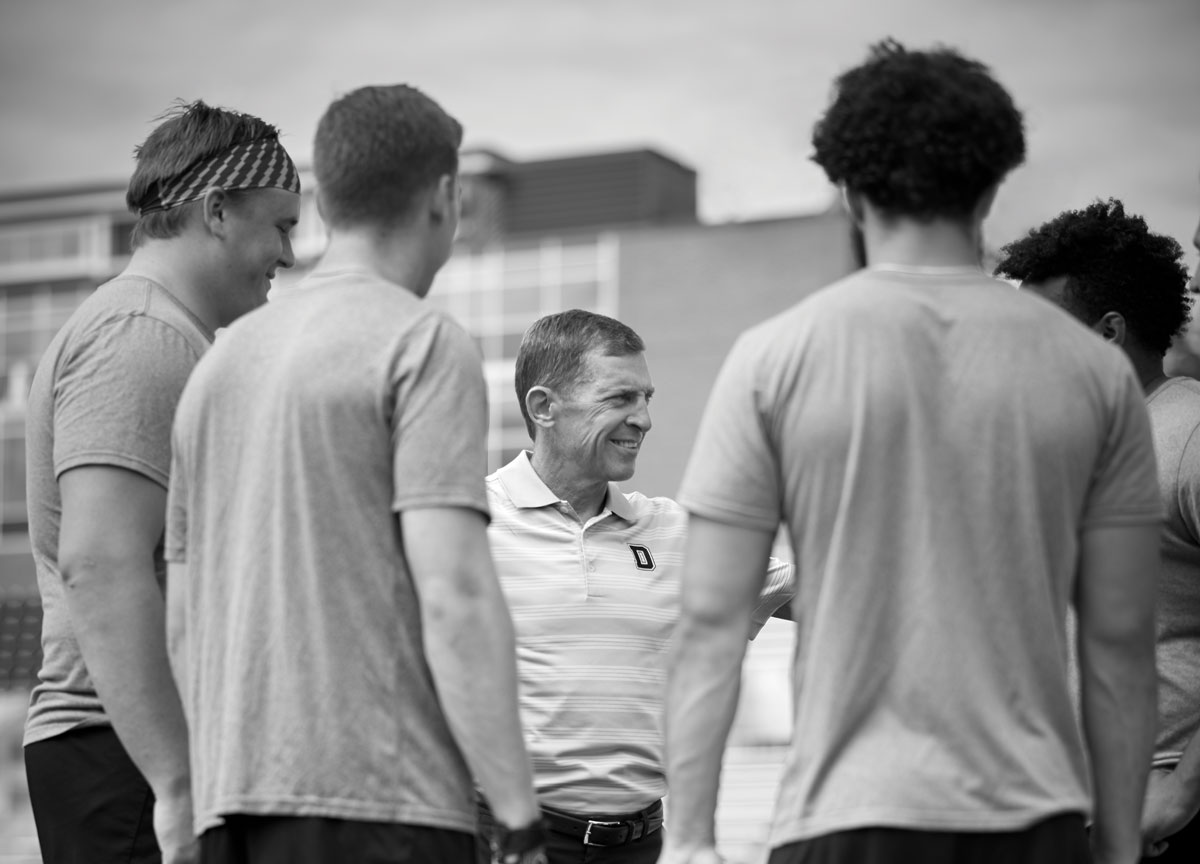“His Life Was a Gift”
There he was, shoveling the snow off the “D” at the center of the Memorial Field turf. There he was, sitting in a recruit’s living room trying to persuade a gifted running back that he ought to come to Dartmouth, where the football team only weeks earlier completed its only 0-10 season, rather than to Harvard, which was coming off its second straight Ivy League championship.
There he was, running into an old friend on a chilly spring day and handing him his green Dartmouth jacket—and telling him to keep it, he had a closet full of that particular sartorial style. There he was, on the phone telling an alum he had an offensive lineman who was the kind of young man who deserved a break for a summer internship.
There he was, on national television explaining why less was more when it came to physical contact during practice. There he was, at the center of a semi-circle, surrounded by his players, leading his team in a creaky post-game rendition of “Dear Old Dartmouth.”
There he was, huddling with Archie Manning and Steve Spurrier, gold-plated Southern-fried icons of the gridiron sport, sharing some insights about passing that he refined in late-night ruminations in a faraway corner of New Hampshire.
There he was, Dartmouth’s football coach. No one fought harder to recruit his players or keep them safe; no one crumbled more barriers of the hidebound calling of collegiate football coaching; no one had more days in the dark valleys of sporting despair before reaching the sunlit uplands; no one loved his college more; and no one fought harder to keep for her its old undying faith.
Buddy Teevens, class of 1979. Buddy Teevens, the class of his craft.
In the long history of the Hanover Plain, only a few figures have been known by their first names alone. Some, to be sure, required two (Ernest Martin, John Sloan), but for single-name identities there have been only a handful, Upper Valley analogues of Cher, Beyoncé, Ringo, and Britney: Eleazar, the visionary who hacked out a fragile institution in an ice-crusted wooded wilderness; Lou, who founded a Main Street diner that made the word “cruller” part of an Ivy League college’s lexicon; Abbey, whose running legend only grew when she helped a fellow 2016 Olympic competitor reach a finish line after a calamitous collision in Rio de Janeiro; Phil, a quiet mathematician who until earlier this year was the steward of his alma mater; and, in recent months, Sian, the 19th president of the College.
All of them plus one more: Buddy.
He wasn’t born Buddy, of course; no one is. He was named Eugene Francis Teevens III, though from the start he was “Buddy,” which is the best example any of us will have, aside from maybe the tennis player Margaret Court, of an aptronym, the phenomenon that occurs when a name perfectly matches a person’s identity or occupation. (Buddy was, well, a congenial, reliable buddy.) That’s one of the many word games that can be applied to the onetime history major for whom the game of football was the Word. Here’s another: For Buddy Teevens, the walk of life was a sprint. And we should note that for those in the precincts that mattered most to him, the numerals at the end of his name that mattered most to him weren’t the Roman III but the Arabic ’79.
“Everyone loved Buddy. He was a great teammate, an inspiration as a coach, and a loyal friend. I will miss him forever.” —Reggie Williams ’76
And so when he died in September, six months after he was hit on his bicycle by a pickup truck on a Florida highway—after he lost his consciousness and his leg, after he was treated in rehabilitation centers in three states—Dartmouth and the football world were drawn into a black hole of pain when the word spread, by text and cell phone and then in the papers, that Buddy Teevens, the winningest coach in his College’s history, had lost his last struggle.
“He has left such a hole in our lives,” said Shoun Kerbaugh ’76, Th’77, Teevens’ quarterback coach. Archie Manning called me at 3:40 in the morning to say, “I was crazy about him. I never met anybody who didn’t like Buddy Teevens.”
A few hours later NFL commissioner Roger Goodell checked in to say that Teevens “was one of the most remarkable men I’ve ever known,” adding, “I am so glad he came into my life.”
The Tiger Blog, a Princeton sports outlet, wrote, “If you follow Ivy League sports, then you were crushed by the news Tuesday night that Dartmouth’s Buddy Teevens had passed.” A week later The Harvard Crimson—the student paper at the university generations of Dartmouth football coaches targeted for special enmity—spoke of Teevens’ “resilient, competitive nature.”
Teevens was not a saint or a compulsive over-achiever. In the rhetorical formulation George W. Bush used to explain his own past, when Buddy was young and stupid, he was young and stupid. As a young assistant coach at Boston University, he’d been told by head coach Rick Taylor to make sure his shirts were pressed and to dress like a coach, not a student. Overall, he lost more football games (178) than he won (151). His Dartmouth teams once lost 17 consecutive games, a mortifying record for the college that still has the most Ivy League football championships. He was fired from his position at the commanding heights of the small group of institutions where the phrase “scholar-athlete” is no contradiction in terms; his Stanford teams went 10-23, and he failed to beat Notre Dame, USC, or Cal even once. And yet the most vivid memory of the Teevens era at Stanford came in a Macbeth moment—nothing in his years there became him like leaving it—when he turned up at the press conference announcing his own firing.
Even at Dartmouth—especially at Dartmouth—there were lean years for a man who so hungered for success. In the beginning of his second stint as the Big Green coach—his first tour of duty ended when he departed after five years for Tulane—he won nine games and lost 41 during five years. The mandarins of Parkhurst and Alumni Gym planned to fire him as the 2011 campaign came to an end, but somehow—even now the mystery endures—he beat Brown, 21-16, in mid-November, in Providence, Rhode Island, and then came home to defeat Princeton, 24-17, in the season finale to salvage the season and his job.
“He never had easy head-coaching jobs,” David Cutcliffe, the former Tennessee, Ole Miss, and Duke coach, told me. “It is an extreme challenge to take those environments and create a quality atmosphere for the players who come to play for you. I know what he went through, and he never said a negative thing about where he was or any of the players he ever had.”
The stories, the stories. They came pouring out in the days after Teevens died. It took just a few telephone calls to elicit more memories of Buddy.
Callie Brownson was coaching a women’s clinic in 2018 in conjunction with the Manning Passing Academy when Teevens asked her for advice in his quest to refine his vision for the clinic. “He wanted it to be perfect,” she said, and together they plotted on a whiteboard. Then he offered her a full-time job as the first female assistant coach for a Division I football team.
“I spent an unbelievable amount of time learning the game from him, but he spent most of the time teaching me to learn how to be a better person,” said Brownson, now assistant wide-receivers coach for the NFL’s Cleveland Browns. “We talked a lot of football, but we talked more about life skills and leadership skills, about overcoming adversity. He hired a woman as a coach because he thought it was the right thing to do. He knew his colleagues would raise an eyebrow and be confused. He didn’t care.”
Dave Shula ’81 was Teevens’ favorite receiver when Buddy was the quarterback of the 1978 team that won the Ivy League championship. When the coaches summoned the players for a team picture the Ivy Player of the Year didn’t show up. Shula, later the head coach of the Cincinnati Bengals and for the past six years Dartmouth’s assistant wide-receivers coach, asked Teevens why he skipped the photo shoot. “I didn’t want to miss the first day of hockey practice,” he said.
Omar Khan was a Tulane freshman fired with desire to spend a life in sports but without any experience when he approached Teevens in New Orleans and asked for advice. Teevens hired him on the spot as an undergraduate assistant for the football team and became his lifelong mentor, eventually using his influence to get him a player-personnel internship with the NFL’s New Orleans Saints.
“I would not be where I am if it weren’t for Coach Teevens,” said Khan, now general manager of the Pittsburgh Steelers. “He gave me my first shot in football and took the time to teach me not only about the game but how to conduct myself as a man. Buddy was first-class all the way around, and he always, always, always called to check up with me.”
Merritt Alves is the mother of Nick Schwieger ’12. When Teevens came calling at her home on what seemed like a hopeless recruiting mission by the coach of a team that hadn’t won a game all season, she and her son gave the Dartmouth coach a respectful but skeptical hearing. Everyone in the room knew that Buddy’s lifelong friend, Harvard coach Tim Murphy, was a more credible suitor.
But during the course of three hours, the family warmed to Teevens. “He was just a very genuine person,” Alves, the membership and training coordinator at the Association of Marina Industries in Warren, Rhode Island, told me. “He made it feel like Nick would be going to another family, going from our family to someone such as Buddy whom you could trust. It was a very secure feeling for all of us. He made Nick go to a losing football program instead of a winning one.”
Schwieger, now vice president of Suffolk Construction in San Francisco, became Dartmouth’s all-time leading rusher and was Ivy League Player of the Year in 2011. “Coach Teevens is why I went to Dartmouth,” he said.
Rick Taylor was an assistant coach at Dartmouth when he first encountered Teevens, who after graduation became running backs coach at DePauw University in Indiana (hired by Jerry Berndt, assistant to Jake Crouthamel ’60 at Dartmouth in the 1970s). Soon Taylor picked him off to serve as offensive coordinator at Boston University and then Teevens moved to the University of Maine in 1985 at age 28 as the youngest Division I head coach in the country.
“Buddy decided to run the Boston Marathon without any training whatsoever,” said Taylor, later the athletic director at the University of Cincinnati and Northwestern. “He entered and finished the marathon, but at the end he looked as if he had Scooby-Doo legs that were so rubbery he was unable to stand. For the next two weeks he sat in our meetings with ice bags on his legs.”
The news came in the afternoon, and at the end of practice interim coach Sammy McCorkle, who had been a graduate assistant when Teevens was at Florida and had coached with him for two decades, gathered the team and told them to assemble in Room 105 of Floren Varsity House, in some ways the Building that Buddy Built.
There he told them that the man who had recruited them, coaxed, and coached them had died at 66.
“There was shock,” McCorkle said. “It was quiet. A few stared away, a few dropped their heads. But it was quiet, really quiet.”
It was quiet in Floren because the loss was personal and profound. And it was quiet at the farthest corners of the campus and quiet among a great fraction of the Dartmouth alumni community, all swiftly and deeply in mourning for the coach who—more than Jess Hawley, class of 1909, who coached the Dartmouth team that won the 1925 national championship, more than Earl “Red” Blaik, who led the undefeated 1937 team that turned down a Rose Bowl appearance, more than Bob Blackman, who presided over the last Dartmouth team to be nationally ranked—was the personification of Dartmouth football.
Soon the encomiums rolled in. “We owe him so much,” Peyton Manning, the onetime Indianapolis Colts and Denver Broncos quarterback, said on NBC. “Football owes him so much.”
Teevens, who won five Ivy League championships as Dartmouth’s head coach and was chosen New England Coach of the Year three times, revived the College’s football profile twice, in both the late 1980s and then again in the second decade of this century during a period known around the athletics department as “Buddy II.” He asked Rick Taylor to return to Hanover to examine the infrastructure of football at Dartmouth, and his onetime mentor tutored his protégé on how to strengthen the football program with improved facilities, increased attention to nutrition, and a fundraising offensive from the Friends of Dartmouth Football to put Teevens’ teams on an equal footing with Harvard, Yale, and Princeton.
But the thing about the Buddy Effect was that it was only partially—actually, probably less than half, maybe a quarter—about football.
“I spent an unbelievable amount of time learning the game from him, but he spent most of the time teaching me to learn how to be a better person.”
He had, to be sure, mounted a crusade against gridiron injuries, an effort that began with banning contact in practice and then included a walk down to the Thayer School of Engineering, where Teevens and his classmate, Thayer research engineer John Currier ’79, Th’81, tinkered with what was then a mere glint in Teevens’ eye. The 160-pound, battery-powered device known as the MVP (Mobile Virtual Player) now is used throughout the college game and in the NFL and prompted this remarkable headline in The Wall Street Journal: “Dartmouth is the Blueprint for NFL Success in 2020. Yes, Dartmouth.”
And Teevens was an institution at the Manning Passing School he and the paterfamilias of the Manning QB clan developed. When, as this year’s group of young quarterbacks and receivers began to assemble in Thibodaux, Louisiana, it became apparent that Buddy would not be there for the first time in 26 years, staffers wore wristbands reading “PRAY FOR BUDDY” and Archie Manning wore a hat emblazoned “BT STRONG.”
“He was a really good football coach but, most of all, he was a solid guy who was in unbelievable physical condition,” Archie Manning said. “I can’t tell you how my staff is deflated over this.”
Of his great gifts, it was his gift for friendship that was Teevens’ greatest.
“With all his athletic and coaching achievements and accolades, Buddy’s greatest gift to so many of us was his friendship,” said John Carney ’78, now the governor of Delaware. “He gave so completely and unselfishly. He didn’t do anything halfway. And it was never about him. It was always about you and what he could do for you. And we all loved him in return.”
New Dartmouth athletic director Mike Harrity said that Teevens was “a teacher whose classroom happened to be the football field.” Jason Barabas ’93, a Dartmouth inside-linebacker-turned-government professor at the College, was impressed his coach agreed to look the other way when he skipped practice to work on his honors thesis. “He cared as much about you off the field as on the field,” Barabas said.
There were other Teevens lessons, along with the immutable rule that football players should sit in the first third of the rows of a Dartmouth classroom and his practice of rewarding players who received an “A” in a quiz or exam, which rendered him perhaps the last Division I football coach who was not resented or reviled by the faculty.
Humility: “He taught that lesson to his teammates and then to his players,” said Shula.
Discipline: “He preached that we should take our craft seriously and with passion,” said Dan Rooney II ’12, director of business development and strategy for the Pittsburgh Steelers.
Compassion: When running back Pedro Robinson ’15 suffered a concussion, trustee emeritus Peter Robinson ’79 said, “Buddy himself telephoned, displaying remarkable gentleness, even sweetness, as he told my wife and me that our son’s football days were over.”
Focus: “We never had the feeling that hockey was secondary to football,” said Bob Gaudet ’81, a Dartmouth hockey teammate of Buddy and his brother, Shaun Teevens ’82, and later the head coach of the men’s hockey team. “We would marvel at how he would go from football to hockey and was just as passionate on the ice as he was on the field.”
At life’s end, as throughout a lifetime, it is the ties that bind that also reveal.
One of those ties is to the Teevens family, led by his wife, the former Kirsten Anderson, a constant presence at Memorial Field, an all-star Buddy booster, and the bearer of a half year of unbearable hospital waiting-room anguish; their children, Lindsay and Eugene IV; and their four grandchildren.
One of those ties is to Tim Murphy, the Harvard coach who was a teammate at Silver Lake Regional High School in Kingston, Massachusetts; a fellow assistant coach at BU; and then an assistant under Teevens at Maine. They were in each other’s weddings and were godfathers to each other’s firstborn children—a friendship that spanned more than a half century and made post-game meetings after Harvard-Dartmouth games less a ritual than a reunion. “We were like brothers without the complications,” Murphy said. “There was no relationship like this in coaching—or almost anywhere.”
The two were together in Naples, Florida, the day before the bicycle accident and, fatefully, the day after. Murphy drove 320 miles without stopping to be by his friend’s side after the accident. He was with Teevens hours before he died.
And one of those ties is to his college.
Tom Csatari ’74, like Teevens a former Dartmouth football captain, said the key to the coach’s success was “his optimism, his ability to connect with players, their families, and alumni—and his love of Dartmouth.” Government professor Russell Muirhead said Teevens “loved Dartmouth and made Dartmouth lovable,” adding, “This is not a loss from which we can recover, and it is not one we can forget.” His old coach, Rick Taylor, whom Teevens recruited in the fallow years to examine how to make his teams more competitive—and whose three sons attended the College—said of his onetime assistant: “He was Dartmouth—he epitomized everything that was great about a place so different from all the other Ivies.”
Teevens of Dartmouth. The tie that binds, even in death.
David Shribman is a journalist, author, and teacher. He won the Pulitzer Prize in 1995 and edited the Pittsburgh Post-Gazette from 2002 to 2018. The headline quote is from NFL Commissioner Roger Goodell.














